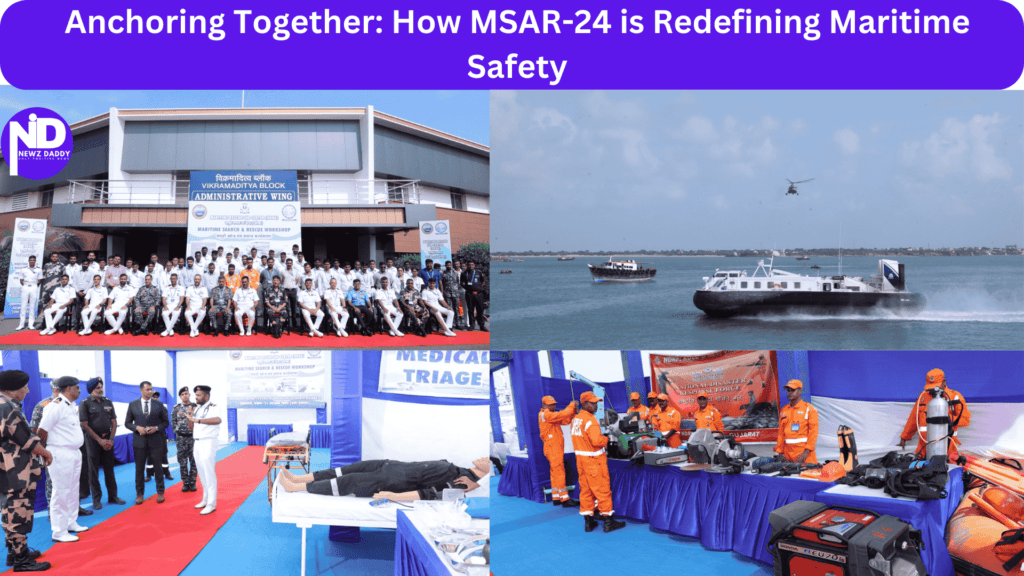Anchoring Together: How MSAR-24 is Redefining Maritime Safety
Newzdaddy Daily News Updates
Synopsis of the Article in Bullet Points:
- A State-level Maritime Search and Rescue Workshop (MSAR-24) was conducted by the Indian Coast Guard on September 24, 2024, at Okha.
- The workshop was organized under the NAMSAR Board with the theme “Mass Rescue Operations at Sea: Development of Local Contingency Plan.”
- Key resource agencies involved included the Indian Navy, Indian Air Force, Border Security Force, District Administration, and various other stakeholders.
- The workshop had two main sessions: one focused on presentations of maritime search and rescue capabilities, and the other involved live demonstrations.
- The first session included discussions on formulating a local contingency plan for maritime rescue operations.
- The second session featured live demonstrations showcasing various rescue operations by the Indian Coast Guard, Marine Police, and Indian Air Force.
- Advanced rescue equipment was displayed by the National Disaster Response Force and the Indian Coast Guard during the event.
State-Level Maritime Search and Rescue Workshop (MSAR-24)
Introduction to the Workshop
In Okha, Gujarat, on September 24, 2024, the Indian Coast Guard held a successful State-level Maritime Search and Rescue Workshop (MSAR-24). Under the auspices of the NAMSAR Board, this significant event sought to improve the capacities of numerous organizations engaged in maritime rescue operations. The workshop’s theme, “Mass Rescue Operations at Sea: Development of Local Contingency Plan,” draws attention to the increasing demand for effective and well-coordinated efforts to save people at sea, particularly in disaster scenarios.
Purpose and Importance
The MSAR-24 workshop’s main goal was to bring together important players from various agencies and organizations that are vital to marine rescue operations. Representatives from the National Disaster Response Force (NDRF), Border Security Force, Indian Navy, Indian Air Force, and District Administration were among those present. These organizations were able to work together, exchange information, and create practical backup plans for large-scale maritime rescue operations thanks to the workshop.
The surge in shipping, fishing, and recreational boating has led to an upsurge in marine emergencies in recent years. For this reason, it is essential to have a well-organized plan for search and rescue operations to guarantee prompt and efficient reactions to any crises that may arise in the maritime context.
Must Read:
Thirteen Lives at Risk: The Indian Coast Guard’s Valiant Effort Off the Gujarat Coast
Workshop Sessions: Presentations and Deliberations
Two main sessions, each concentrating on a distinct facet of maritime search and rescue, comprised the program.
1. Presentations by Key Agencies
Presentations showcasing the expertise of several organizations in maritime search and rescue were given during the first session. The Indian National Centre for Ocean Information Services (INCOIS) provided insightful information on oceanic data and its significance in rescue operations, while the Indian Air Force talked about its aerial assistance capabilities. The Deendayal Port Authority discussed the logistics and resources available for such operations, and the District Disaster Management Authority also shared information on their roles in maritime catastrophes.
The agencies’ ability to discuss and develop a local contingency plan for large-scale maritime rescue operations was greatly aided by this session. The objective was to develop a more effective and efficient crisis response plan by coordinating the actions of all resource agencies.
Live Demonstration of Search and Rescue Operations
The live display of search and rescue skills by multiple resource agencies at Okha made the second workshop session more thrilling. Through this practical approach, participants were able to observe how the theories and tactics covered in the first session were put to use.
1. Demonstrating Rescue Operations
The exercise showcased the tools and abilities of many agencies through a range of rescue operations. The Indian Coast Guard (ICG) put on display its remarkable fleet, which included hovercraft and rescue boats built especially for use in maritime operations.
Boats from the Marine Police also took part, acting out search and rescue scenarios. The assistance of tugs from Okha Port greatly improved the operations and demonstrated how local port resources might support rescue efforts.
2. Aerial Support from the Indian Air Force
An Indian Air Force helicopter from Air Force Station Jamnagar participated in the live display, which was one of its highlights. To demonstrate its vital role in providing aerial help during marine situations, the helicopter carried out mock rescue missions. Rescue operations can be greatly accelerated by aerial operations, particularly when time is of the importance.
3. Display of Advanced Rescue Equipment
During the occasion, the Indian Coast Guard and the NDRF displayed their cutting-edge rescue equipment in addition to the operational demonstrations. This covered a range of equipment and technology utilized in search and rescue missions, highlighting how crucial it is to have access to the newest developments to maximize operational efficacy and efficiency.
Collaboration and Future Prospects
The MSAR-24 workshop established the groundwork for the next maritime rescue operations in addition to promoting cooperation and knowledge exchange amongst important parties. To develop a more coordinated response plan for marine emergencies, the workshop brought together many agencies and promoted conversations about local contingency plans.
Moving forward, it is imperative that the involved agencies maintain their cooperation, hold further training sessions, and participate in frequent drills. By taking a proactive stance, all parties concerned would be better equipped to handle any potential maritime situations with grace.
A Step Towards Better Preparedness
A major step towards improving the preparedness and capabilities of agencies participating in maritime rescue operations has been taken with the successful execution of the State-level Maritime Search and Rescue Workshop (MSAR-24). These kinds of seminars are essential for strengthening networks and creating methods that can save lives in marine catastrophes, given the increasing problems facing maritime safety.
The Indian Coast Guard and its partner agencies can greatly improve their maritime search and rescue capabilities by promoting a culture of cooperation and continual development, which will ultimately lead to safer seas for everybody.
Must Read:
Pride in Every Step: Indian Coast Guard Celebrates Independence with Unmatched Spirit

